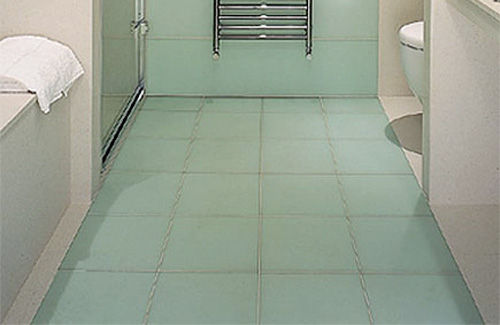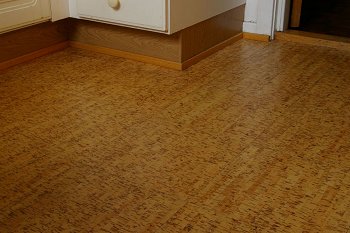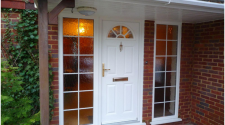As our natural resources continue to dwindle and responsible citizens try to reduce their carbon footprint, making green choices when remodeling your home can help protect the environment, maintain good indoor air quality, and create a unique living space. If you’re in the market for new flooring, consider these green options that are beautiful, unique, durable, and sustainable.
Cork
Cork flooring is made from cork that’s harvested from the bark of the cork oak tree, which is typically found in the Mediterranean. After the bark is harvested, it grows back in about three years, making this flooring option highly sustainable. Cork has natural anti-microbial properties that can help reduce allergens in the home and it contains natural insect repellants. Cork is naturally fire retardant, easy to maintain, and available in a wide variety of finishes for any décor preferences. When properly maintained, cork flooring will last up to 30 years.
Bamboo

Bamboo is a grass that’s similar in many ways to hardwood. The difference is that bamboo grows to maturity in 3 to 5 years, compared to the 20 or more years required for hardwood trees to mature. Bamboo flooring comes in a variety of natural colors and grain patterns, and it can be customized to match or complement other wood components in the home.
Linoleum

Many people believe that linoleum and vinyl flooring are the same thing, which isn’t true. According to the masters of flooring at Duggins Services, vinyl floors are not only easily scratched and gouged, but they won’t improve the resale value of your home, and they’re very difficult to remove once installed. Vinyl flooring is made from chlorinated petrochemicals, which are highly detrimental to the environment and off gas hazardous chemicals into the air in the home. This type of off gassing is a major factor in poor indoor air quality, according to the Environmental Protection Agency. Linoleum, by contrast, is all natural. It’s made from linseed oil, which is derived from flax. The linseed oil is mixed with other natural ingredients like ground limestone, cork dust, tree resins, and wood flours. Linoleum is a natural fire retardant, and since the colors are embedded all the way through the material, they won’t fade. When properly cared for, linoleum floors can last up to 40 years.
Glass Tiles

Made from recycled glass bottles and other glass items, glass tiles are water resistant and mold and mildew proof. They won’t stain, and they’re easy to clean. Glass tiles are extremely versatile, available in endless colors, patterns, textures, and styles. They can be laid in an infinite variety of patterns. Glass tiles are ideal for smaller or darker spaces, as they reflect light, providing an extra layer of brightness to the room.
Rubber

Rubber flooring was once considered suitable only for industrial operations, but rubber flooring in the home is becoming a more popular option due to its modern feel and high level of durability and sustainability. Rubber flooring made from recycled tires isn’t as environmentally friendly as flooring made from natural rubber. Natural rubber is extracted from the tropical rubber tree, which continually produces the substance, making it a highly sustainable option. Natural rubber floors are free of PVCs, halogens, and plasticizers, which are extremely durable, easy to maintain, water and shock resistant, and fire and burn resistant.
















